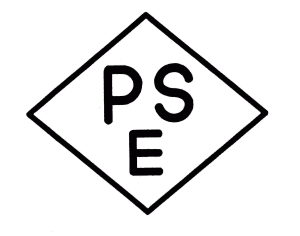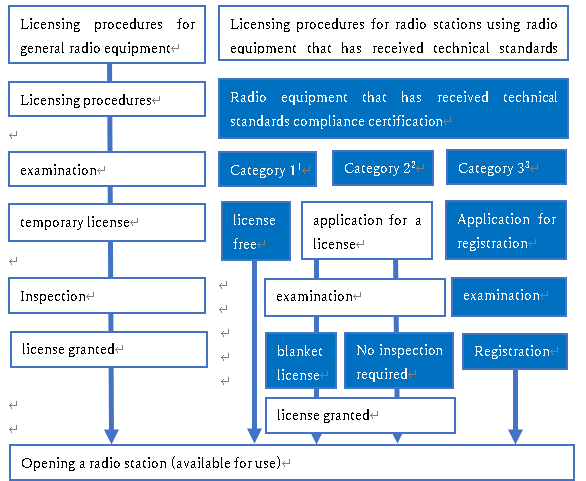This article contains information on importing electrical appliances and material into Japan. Relevant laws briefly covered in this overview include the Electrical Appliance and Material Safety Law, the Radio Law, the Public Management Law (Pachinko Machines).
General Information
When importing electrical goods, a number of laws may be relevant:
- Electrical Appliance and Material Safety Law
- Consumer Product Safety Law
- Household Goods Control Law
- Household Goods Quality Labeling Law
- Industrial Standardization Law (JIS Law)
- Home Appliance Recycling Law
- Law for Promotion of Effective Utilization of Resources
- Energy Conservation Law
- Radio Law (wireless communication equipment)
- Telecommunications Business Law (Devices for communication terminal)
- Water Supply Law (water supply equipment)
- Entertainment Law (pachinko machines).
In addition, the Food Sanitation Law (juicers, coffee makers) and the Pharmaceutical Affairs Law (medical devices such as electric massage machines may also be relevant.
Electrical Appliance and Material Safety Law
1 General Information
The Electrical Appliance and Material Safety Law regulates the manufacture, import, and sale of a wide range of electrical appliances and materials in order to ensure safety of these products.
2 Notification of Manufacturers and Importers
A manufacturer or importer of electrical appliances and materials must notify the Minister of Economy, Trade and Industry of its address and the type of electrical appliances and materials it handles within 30 days of commencement of business. In addition, foreign corporations that have not registered a branch office or a representative in Japan are not allowed to submit the notification.
3 Compliance with Safety Standards and PSE Mark
A manufacturer/importer of electrical appliances and materials shall comply with technical standards (Article 8, Paragraph 1). Relevant standards are set forth in the “Ministerial Ordinance on the Technical Standards for Electrical Appliances and Materials”.
For specified electrical appliances and materials (electric pumps, vending machines, electric toys, etc.), a technical standards conformity inspection must be conducted by a registered inspection body and a certificate of conformity must be issued (Article 9 of the same law). In the case of other electrical appliances (electric kotatsu, electric refrigerator, electric razor, electric stand,), the inspection shall be conducted voluntarily, and the inspection records shall be prepared and stored (Article 8, paragraph 2).
Manufacturers and importers of electrical appliances and materials may display the PSE Mark on their electrical products if they have fulfilled the above obligations, while sales of electrical appliances and materials without the PSE Mark are prohibited (Article 27).
|
|
Products |
Inspections |
Indication |
|
Specified electrical appliance |
・Electric water heaters ・Electric heating and electric toys ・Electric pumps ・Electric massagers ・Vending machines ・DC power supply equipment and more than 100 other items |
It is necessary to pass a conformity inspection by a registered inspection body. Self-inspection is not sufficient. As of the date of publication of this document, the registered inspection bodies include Intertec Japan K.K., TÜV Rheinland Japan K.K., the Research Institute of Electrical Safety and Environment, the Japan Quality Assurance Organization, and the Electric Wire Technical Center. For details, see the METI website. |
 |
|
Other Electrical Appliances |
Electric kotatsu/electric kettle/ electric refrigerator/electric toothbrush/electric razor/incandescent lamp/electric stand/television receiver/audio equipment/lithium-ion storage battery and more than 300 other items
|
It is necessary to pass a conformity inspection, but inhouse inspection is also acceptable. |
 |
Note that smartphones and notebook computers are basically exempt from PSE as enumerated, but lithium-ion batteries and AC/DC adapters are subject to PSE, so it is easy to make a wrong judgment.
4 Long-term use of product safety indication system
For certain products (fans, air conditioners, electric washing machines and electric dehydrators, CRT televisions, ventilation fans) that often cause accidents due to aging and deterioration, labeling of standard use periods and precautions is mandatory.
Radio Law
1 About the Radio Law
Radio waves are used in various technologies such as smartphones, Wi-Fi (wireless LAN), radios, and drones, and the Radio Law regulates the use of radio waves.
Radio waves are limited in frequency, and radio waves of the same frequency interfere with each other, making it impossible to listen to the radio if an illegal wave is broadcast.
Therefore, technical standards and specifications for frequency distribution and management have been formulated, and a licensing system for the establishment of radio stations has been established.
2 What is a license under the Radio Law?
When establishing a radio station that transmits radio waves, it is necessary to obtain a “radio station” license (Same law 4 this article).
The term “radio station” may conjure up images of large-scale equipment, but cell phones, wireless microphones, transceivers also emit radio waves and thus fall under the category of radio equipment.
Therefore, the Radio Law states that if there is no or little risk of interference between radio waves, there is no need to obtain a license. Specifically, in the cases listed in the following table, no license is required.
|
1 |
Weak-wave wireless equipment |
A license is not required if only equipment that emits extremely weak radio waves is used. Exceptions may be made for in-vehicle FM transmitters, wireless microphones, remote controls, car keyless entry, wireless headphones, radio-controlled devices, anti-shoplifting devices, and RFID devices. |
|
2 |
Civil Radio Station |
No license will be required for civil radio stations using radio equipment (limited to those with a technical compliance mark). |
|
3 |
Low-power special-purpose radio stations (Low-power radio station)
|
A license is not required for radio stations using low-power radio equipment for certain applications (limited to those with a technical compliance mark). A wide variety of applications have been specified, including low-power security systems (home security, fire alarms), low-power data communication systems (wireless LAN, Bluetooth), and cordless phones. |
|
4 |
Simplified radio station (Registered station) |
For the following types, registration is considered to be sufficient instead of a license ・PHS radio station base stations (with an aerial power of 1 watt or less) and repeaters ・Premises radio stations (920 MHz band/2.4 GHz band) ・Base stations for radio access systems (5 GHz band) ・Digital simplex radio stations (350 MHz band) |
Since the general public uses radio equipment (cell phones) without obtaining a license or registration, it is considered important for manufacturers/importers to make products with the “weak radio mark” (see (1)) or with the “technical conformity mark” [for low-power radio stations] (see (3)) if they want to make them widely available to the general public.
None of the exceptions in (1) through (4) above can be utilized for cell phones. For cell phones, the base station and the handset (corresponding to a land mobile station) are considered as a pair, and the cell phone operator is supposed to apply for a license for both, so the user does not need to apply for a license under the Radio Law.
3 Standard Certification System under the Radio Law
The Radio Law stipulates the technical standards specified in the Radio Law for a certain range of radio equipment, “Specified Radio Equipment”. to be used for small-scale radio stations, and a system has been established in which a person registered by the Minister of Internal Affairs and Communications (registered certification body) judges whether or not the equipment complies with the relevant standards.
The following table simplifies the licensing procedures for radio stations that use radio equipment bearing the technical conformity mark.
 Translation of [Source: Japan Electronics and Information Technology Industries Association (JEITA) website.]
Translation of [Source: Japan Electronics and Information Technology Industries Association (JEITA) website.]
First, for specified low-power radio stations, Wi-Fi, Bluetooth, BLE, Zigbee, etc., no license or registration is required as long as the radio equipment with the technical compliance mark is used (Category 1 above; Article 38-2-2, Paragraph 1, Item 1 of the same law).
Second, in the case of cell phones, 5G, LTE and WCDMA handsets (“specified radio stations”), a comprehensive license can be obtained, eliminating the need for inspections of each individual radio installation (Category 2 above; Article 38-2-2, Paragraph 1, Item 2 of the same law). Taking cell phones as an example, it is not necessary for users to open their own radio stations to use cell phones, since telecommunication carriers, etc. have obtained a comprehensive license in advance on behalf of the actual users.
Third, in the case of base stations other than those mentioned above (radio buoys, on-premises radio), these devices can be used by eliminating the need for inspection when obtaining a license, or by substituting a simpler radio station registration for obtaining a license (Category 3 above; Article 38-2-2, Paragraph 1, Item 3 of the same law).
4 Obtaining the “Technical conformity mark” based on the Radio Law
Under the licensing and registration system mentioned in the previous section, most of the radio equipment in general use bears the mark of Technical Regulations Conformity Certification, the so-called “Technical Conformity Mark”.
For example, the wireless LAN-compatible router (manufactured by NTT) for my personal use, has a technical compliance mark as shown below.
 |
T Certification Number:××× ×× ×××× ××× R Certification Number:×××―×××××× |
The R mark is an indication of conformity to the technical standards (“Technical Regulations”) under the Radio Law. It is often attached to things that generate radio waves such as wireless microphones, transceivers, cell phones, routers.
The T mark is an indication of compliance with technical standards under the Telecommunications Business Law.
It is often attached to terminals that connect to the facilities of a telecommunications carrier such as NTT’s communication facilities, (smartphones/old cell phones, analog phones, fax machines, and routers.
Basically, devices that do not have the technical compliance mark on them cannot be used in Japan. The same applies to imported foreign products, as it will explained in the next section.
The requirements and standards for obtaining the “technical conformity mark” are specified in the “Regulations Concerning Technical Regulations Conformity Certification of Specified Radio Equipment”.
In order to obtain the “technical conformity mark”, a conformity inspection to the technical standards by a registered certification body is required. However, there have been certain exceptions such as the special specified radio equipment. If the contractor verifies the construction design by himself and confirms that it conforms to the technical standards, the contractor can be considered to have obtained the technical standards conformity certification. The “Technical conformity mark” can be obtained by submitting the prescribed notification to the Minister of Internal Affairs and Communications after self-confirmation (Article 38-33 of the same law).
For specific test methods, please refer to the website of the Ministry of Internal Affairs and Communications.
5 Regulations on imports
In relation to imports, the Radio Law provides exceptions to imports of radio equipment. First of all, in order to import “specified radio equipment” from overseas and use it in Japan without a license, it is necessary to obtain a technical standards conformity certification from a registered certification body and attach a technical conformity mark (Article 38-6 of the same law). Even if a product already has an American FCC mark standard or an European EC mark standard affixed to it, it must be given a new Japanese technical compliance mark.
However, when importing products from countries that have concluded a Mutual Recognition Agreement (MRA), such as the U.S., Europe, and Singapore, if the product is certified by a certification body in these countries, it will be treated as having obtained a Technical Regulations Conformity Certification and can bear the Technical Regulations Conformity Mark.
In addition, importers who import transceivers of foreign standards shall endeavor to avoid importing radio equipment that does not conform to technical standards specified in the Radio Law (Article 102-11, paragraph 1 of the same law). When a radio station using equipment that does not conform to such standards is likely to interfere with radios of other radio stations or cause serious adverse effects to their operations, the Ministry of Internal Affairs and Communications may issue recommendations and orders to take necessary measures (Article 102-11, Paragraph 2 and Paragraph 4 of the same law).
Public Management Law (Pachinko Machines)
The Entertainment Establishments Control Law does not specifically regulate the importation of pachinko machines. However, prefectural approval is required for the replacement of pachinko machines (Application mutatis mutandis of Article 9, paragraph 1 pursuant to Article 31-23 of the Act), and pachinko machines cannot be used for pachinko business unless they do not meet the standards set by the National Commission (Article 20, Paragraph 1 of the Law).
As a result, approval for machines to be installed in pachinko parlors cannot be granted unless the Public Safety Commission certifies that the machines in question do not meet the standards set by the National Commission, effectively making it impossible to install them. Application procedures for certification are described in the “Regulations Concerning Certification and Model Approval of Amusement Machines”. If the type has already been verified, this approval procedure will be simplified.
Therefore, as an importer, it is useful to apply for certification for pachinko machines (Article 20, Paragraph 4 of the Law) and obtain approval for the model of the machine to be imported before importing the machine.
———————————————————————————————————————–
Please contact us if you have any questions.
